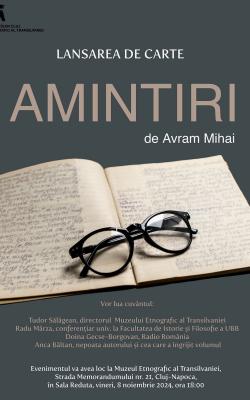BOOK LAUNCH
"There are no memoirs, even those written by insignificant persons, that do not conceal in them social or picturesque values of the first order"... (Giuseppe Tomasi di Lampedusa)
More than 50 years have passed since the last writings of Avram Mihai, a man "with a book" who put down on paper, now outdated by time, a significant part of his life. Who was Avram Mihai and how valuable his writings and memoirs are, we invite you to find out at the book launch of "Memories", written by his niece, Anca Băltan and published by Editura Actual, Cluj-Napoca. The event will take place at the Ethnographic Museum of Transylvania, 21 Memorandum Street, Cluj-Napoca, in the Reduta Hall, on Friday, 8 November 2024, at 18:00.
Written with sincerity and talent, the volume is a captivating and instructive read, and it refers to a period of Transylvanian history that Avram Mihai presents from the perspective of an eyewitness.
The volume was originally a series of four handwritten notebooks in chemical pencil. Their author, Avram Mihai, was born in Lancrăm on 10 May 1897. After completing his first six years of schooling in his native village, he was forced to work from a very young age and practised a wide variety of trades: shoemaker's assistant, a coachman's cobbler, a labourer for a Saxon pharmacist and a postman. Avram Mihai managed to get a job at CFR Sibiu and continue his studies. He witnessed many historical events: the flight of Aurel Vlaicu, the mobilisation of the Emperor of the Austro-Hungarian Empire, the retreat of the Saxons from Alba Iulia and the entry of the Romanian army, but also the takeover of Transylvanian institutions by the Romanian authorities after the Great Union of 1918. He accompanied Vasile Lucaciu in the railway carriage in which he set off on his electoral campaign through Great Romania immediately after the war.
Avram Mihai's recollections begin in his early childhood years, at the end of the 19th century, and unfortunately end in 1921. Although she knew of the existence of the four yellowed notebooks covered with his coloured pencilled handwriting, the author's granddaughter, journalist Anca Baltan, only began transcribing them in 2022. The end of the coronavirus pandemic was a good spur to our ephemerality. (Anca Băltan, journalist).
Speakers: historian Tudor Sălăgean, director of the Ethnographic Museum of Transylvania, historian Radu Mârza, lecturer at the Faculty of History and Philosophy of the UBB, journalist and writer Doina Gecse-Borgovan, Radio Romania and Anca Băltan, the author's niece and the author of the book.











